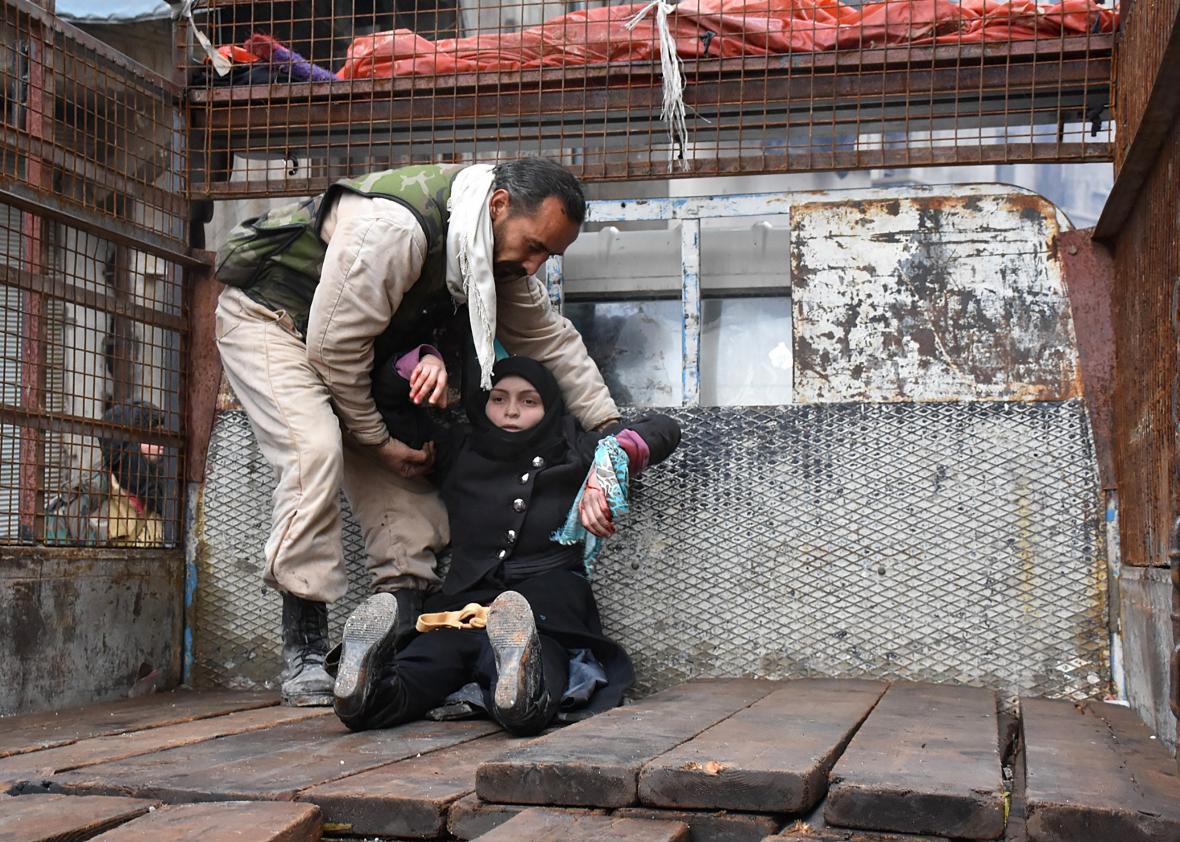
George Ourfalian/AFP/Getty Images
President Bashar al-Assad’s regime and Syrian rebel groups have reached a cease-fire set to go into effect at midnight local time, Russia announced on Thursday. This is the third such cease-fire in the past year, with the previous two attempts to pause the country’s nearly six-year-long civil war having crumbled within months or days.
Russian President Vladimir Putin announced a seemingly more ambitious deal this time, though, with the twice-stated caveat that the cease-fire would be “fragile.” As the New York Times reported, Putin announced that seven rebel groups had signed three separate agreements with Assad: one ceasing hostilities, another outlining the implementation of the cease-fire, and a third statement of readiness to start peace talks.
Turkey, which backs the ouster of Assad, and Russia, which is his regime’s strongest supporter, will be the guarantors of the latest truce.
The cease-fire does not extend to terrorist groups like ISIS and the Syrian affiliate of al-Qaida, or “groups linked to them,” though the definition of that is vague. As the BBC reported, it also does not include the Kurdish Popular Protection Units, which controls a large part of Northern Syria along the Turkish border and is considered by Turkey to be a terrorist group.
Included, however, is the High Negotiations Committee rebel faction seen by the United Nations as the main opposition group, according to the BBC. “[The] ceasefire will take in the rebel-held eastern Ghouta area near Damascus, which had been a sticking-point in negotiations,” the British network wrote on its website.
Syria suggested that its taking of eastern Aleppo, which is part of Syria’s second largest city and had been a stronghold for opposition fighters, earlier this month had paved the way for the deal. The Times noted that rebel groups now had no remaining strongholds in major cities, which may have left them more ready to negotiate a peace that would be more favorable to Assad. The BBC reported that Osama Abu Zaid, a spokesman for the Free Syrian Army, “still insisted that President Bashar al-Assad would have no place in the future of Syria.”
The Times reported, though, that peace negotiations could begin as soon as next month:
Mr. Putin said that Mr. Assad’s government and the opposition would take part in peace talks in Kazakhstan, but he did not give a date. A leaked text of the agreement said the talks would begin a month after the cease-fire went into effect.
The Russians said the cease-fire would extend to 62,000 opposition fighters, the Times reported.
The Guardian noted that there may be some confusion over who is covered by the deal, however, with opposition fighters saying it covered all rebel-held territory and any factions fighting in those territories. This, according to opposition fighters, included the al-Qaida-linked Jabhat Fateh al-Sham that was previously known as the al-Nusra Front and excluded from past cease-fires.
The latest cease-fire in the conflict lasted a single week in September. The one before that lasted from February to July.
The estimated number of deaths from the conflict is between 300,000 and half a million people. The United Nations lists 4.8 million international refugees as having fled the country and 6.3 million people as internally displaced within Syria. One human rights group reported earlier this month that it had documented more than 90,000 civilian casualties including nearly 16,000 children.
The Washington Post reported that the attacks on civilians kept going even on Thursday:
[As] diplomacy continued, so did the fighting. A Syrian rescue group known as the White Helmets said Thursday that at least 12 people were killed and 27 others injured in airstrikes and artillery shelling on civilian homes in the Damascus suburb of eastern Ghouta.
Footage from the area showed an elderly man being carried to an ambulance, his blood-soaked scarf streaking the vehicle as his stretcher was placed inside.
The conflict started in 2011.